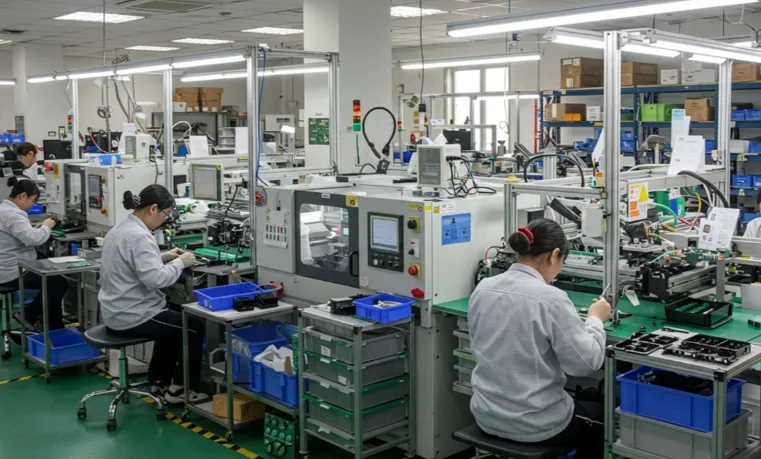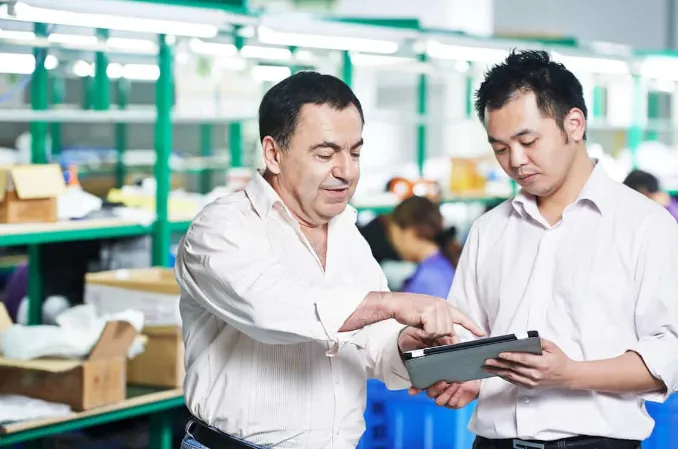What is a Factory Sourcing Agent? A Guide to ESG and Strategic Outsourcing

If you're thinking a factory sourcing agent is just a middleman who sends emails and collects a fee, you're in for a welcome surprise. Think of them instead as your dedicated eyes, ears, and boots on the ground in your key manufacturing hubs.
In short, a factory sourcing agent is a professional or firm that acts as your company's direct representative. They specialize in finding, vetting, and managing factory relationships to get you the right product, at the right quality, for the right price, and—critically—with far less risk.
Here’s the key difference: a trader sells you products they’ve already sourced. An agent works for you. Their goal is to execute your strategy, protect your interests, and build a supply chain you can actually depend on.

This is a make-or-break distinction, so let's break it down. Your choice here defines where loyalties lie.
| Factory Sourcing Agent | Trading Company | |
|---|---|---|
| Who They Work For | You. They are your representative. | Themselves. They are a reseller. |
| Business Model | Service fee (transparent). | Markup on product (often hidden). |
| Factory Relationships | Works with multiple factories to find your best match. | Sells you products from factories they have deals with. |
| Control & Transparency | High. You get full factory visibility and direct communication. | Low. You're often kept away from the actual manufacturer. |
The bottom line? An agent’s incentive is to get you the best possible deal and quality to earn your long-term trust. A trader’s incentive is to maximize their margin on each transaction.
This is where we get into the nitty-gritty. A professional agent’s job is a full-cycle process, not a series of random tasks. Here’s how it works in practice:
First, we don't just Google "widget factory." We use a combination of industry databases, local networks, and on-the-ground intelligence to create a long-list of potential suppliers. Then, we screen them against your specific needs: Do they have the right machinery? The right certifications? The right production capacity? This phase is all about filtering out the obvious "no's" before we invest real time.
This is your biggest risk mitigation step. A virtual "factory tour" isn't enough. We conduct formal audits to check:
Business Legitimacy: Business license, export history, and financial stability.
Quality Capability: Is their Quality Management System (QMS) a paper tiger or is it actually followed on the production line?
Production Capacity: Can they handle your order volume and your forecasted growth?
ESG & Ethical Compliance: (This is critical today). We verify social responsibility records, check for mandatory labor practices, and assess environmental compliance. No one wants a surprise headline about their supply chain.

Now we talk money and specs. This isn't just about haggling over unit price. We break down the Total Landed Cost—raw materials, labor, tooling, packaging, and logistics. We manage the sampling process, ensuring you get pre-production samples that accurately reflect what mass production will deliver. We also lock down key details like Payment Terms (e.g., 30% deposit, 70% before shipment) and IP Protection in the contract.
This is where orders go off the rails without proper oversight. We don't just wait for the shipment date. We conduct:
Pre-Production Checks: Verifying that the right materials are on the factory floor.
During Production Inspection (DUPRO): Catching issues mid-stream, when they're still fixable.
Final Random Inspection (FRI): The last line of defense before goods are shipped. We use standardized AQL sampling to statistically validate quality. If 5% of the goods are defective, we don't just tell you—we hold the shipment and work with the factory on a 100% sorting and repair plan.
Our job isn't done when the goods leave the factory. We coordinate with freight forwarders, handle customs documentation, and ensure the handoff from the factory door to your shipping partner is seamless. We make sure you know exactly where your goods are and when they'll arrive.
Sure, we save you money by negotiating better and avoiding costly mistakes. But the real value is in risk mitigation and strategic advantage.
Mitigating Supply Chain Risks
What happens if your main factory has a fire? Or gets hit with trade sanctions? A good agent has a diversified network and can quickly pivot you to a vetted alternative. We also help with dual sourcing—splitting orders between two factories to ensure you're never completely out of stock.
Ensuring Quality and Consistency
A cheap unit price means nothing if 30% of the goods are defective. We enforce the quality standards you define. We’re the objective third party who isn’t afraid to tell a factory manager to re-run a production line because the color is off by a shade.

The Strategic Role in Sustainable and Ethical Sourcing
Let's be practical. You have ESG goals, but auditing a factory halfway across the world is tough. We act as your on-site ESG officer.
We ask the tough questions: Can you show us your waste management permits? Can we interview your line workers privately? Can you prove your materials are sourced responsibly?
We help you avoid greenwashing by providing verified, on-the-ground data for your sustainability reports.
This isn't just "nice to have." It directly protects your brand reputation and future-proofs your supply chain against tightening regulations.
Don't just pick the first name you find. Do your homework.
Define Your Needs & Non-Negotiables: Before you even start looking, know what you need. What are your must-have certifications? What are your deal-breakers on ESG?
Verify Their Specialization: If you make automotive parts, an agent who specializes in garments won't have the right factory network or technical knowledge. Ask for case studies in your industry.
Scrutinize Their QC Process: Ask them: "Walk me through your quality inspection process. What AQL level do you typically use for consumer goods? What's in your factory audit checklist?" Vague answers are a major red flag.
Request & Check References: A reputable agent will gladly connect you with a past client. Ask that client about communication, problem-solving, and whether the agent actually saved them from a major issue.
Understand Their Fees & Communication: Get a clear breakdown of their fee structure. How often will they update you? What communication platform do they use? You need a clear service level agreement (SLA), even informally.
This is a strategic choice, not a right-or-wrong one. Here’s a quick guide:

Build an in-house team if: You have very specialized, proprietary technology; you're making huge, predictable volume purchases; and you have the budget and time to build and manage a team abroad.
Partner with a sourcing agent if: You need flexibility and speed; you lack the local language skills, cultural knowledge, or network; your product isn't hyper-specialized; and you want to tap into expert knowledge without the overhead.
For most small to mid-sized companies, an agent provides the best blend of expertise, flexibility, and cost-effectiveness.
If you can't measure it, you can't manage it. Here are the key metrics we use to gauge performance:
Cost Performance: Cost Savings % against your initial target, and Total Landed Cost Accuracy.
Quality Performance: Product Defect Rate (from your own receiving inspections) and On-Time Delivery %.
ESG & Compliance Performance: Supplier ESG Audit Score (e.g., using a 100-point scale), Corrective Action Resolution Time (how long it takes a factory to fix a non-conformance), and Carbon Emission Reporting Rate.
Look, navigating international manufacturing is complex, but it doesn't have to be a gamble. A true factory sourcing agent isn't a cost; they're an investment in a more resilient, responsible, and profitable supply chain.
And if you're ready to discuss your specific product needs and how we can help you build a secure and ethical supply chain, let's have a direct conversation.
[Schedule a Free, No-Obligation Consultation with Our Sourcing Experts]
1. How do you structure your fees? Is it a flat project fee, commission, or hourly rate?
Most professional agents use a transparent service fee model, agreed upon upfront. This could be a flat fee per project, a monthly retainer for ongoing work, or a percentage of the total purchase order value. The key is that it's transparent and not a hidden markup on the product. We avoid hourly billing as it doesn't align with your goal of efficiency.
2. What happens if I'm not happy with the final product quality after inspection?
Before production, we agree on a detailed Quality Inspection Checklist. If the final inspection fails against this checklist, we don't authorize shipment. We then work with the factory on a solution: 100% sorting and repair, a re-run of production, or in severe cases, canceling the order and navigating the deposit recovery process. Our goal is to catch issues before you pay the balance.
3. How do you protect my intellectual property and product designs?
Beyond a standard NDA, we ensure the factory signs a robust IP Protection Agreement before any designs are shared. We also manage the flow of information, releasing technical drawings in stages. For critical components, we can even help you split production between different factories so no single supplier has the complete "recipe."
4. Can you help me if I only have a rough sketch or a prototype?
Absolutely. A key part of our service is taking a concept and making it production-ready. We can connect you with engineering partners to create CAD drawings, 3D models, and functional prototypes. We'll also advise on "Design for Manufacturability" (DFM) to simplify production and reduce costs right from the start.
5. How do you handle communication and time zones?
We act as your primary point of contact, so you're not chasing factories at midnight. We operate on your time zone for strategy calls and the factory's time zone for daily management. We use a central platform (like Slack or MS Teams) for all communications, so you have a full audit trail of every decision and update, accessible anytime.
6. What's your process for finding a new supplier for a highly specialized component?
We start with a deep-dive technical briefing with your team. Then, we tap into industry-specific associations, B2B manufacturing platforms like Thomasnet or Kompass, and our network of technical consultants. We look for suppliers based on their machinery capabilities and past project portfolios, not just their marketing claims.
7. Do you handle the entire import and customs clearance process for my country?
We typically manage the export process from the origin country. For a seamless experience, we strongly recommend and can introduce you to a trusted freight forwarder in your country who will handle the ocean/air freight, customs brokerage, and final delivery to your warehouse. This split ensures experts are handling the complex regulations on both ends.
8. I'm worried about a factory cutting corners after I've paid the deposit. How is this monitored?
This is a real risk we mitigate through unannounced During Production Inspections (DUPRO). We show up at the factory without a schedule to audit the production line, check raw materials, and verify that the agreed-upon manufacturing processes are being followed. This keeps the factory accountable throughout the entire process.
9. Can you help me negotiate better payment terms beyond the standard 30/70?
Yes. We have more leverage with factories due to our relationship and volume of business. We regularly negotiate terms like 20/80, or even 10/90 for established partners. For large orders, we can explore Letters of Credit (LC) or other trade finance solutions to de-risk the transaction for both parties.
10. How do you vet a factory's financial stability to ensure they won't go out of business mid-order?
As part of our due diligence, we require factories to provide business registration documents and, for large projects, we run third-party financial health checks. We also look for indirect signs of stability, like long-term employees, ongoing investment in new equipment, and a diverse, reputable client base.
11. What is your contingency plan if there is a major disruption, like a port strike or a sudden lockdown?
We build contingency into your supply chain from day one. This includes identifying alternate ports for shipping, having a list of pre-vetted secondary suppliers for critical components, and maintaining a buffer in your production timeline for unforeseen delays. When a disruption hits, we already have a playbook to execute.
12. How do you handle sample approvals, and who pays for the sampling costs?
We manage the entire sampling process. Typically, the client pays for the sample costs and expedited shipping. We ensure the factory provides a detailed sample cost breakdown and we inspect the sample against your specifications before it's ever sent to you, saving you time from reviewing non-conforming prototypes.
Contact us
Call Us: +86 193 7668 8822
Email:[email protected]
Add: Building B, No.2, He Er Er Road, Dawangshan Community, Shajing Street, Bao'an District, Shenzhen, China